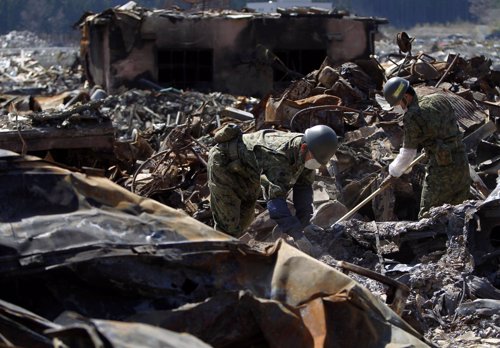The Government of Japan has approved the outline of the reconstruction plan for the next three years, after the earthquake and tsunami that struck on March 11 on the east coast. "When the Prime Minister, Naoto Kan, explaining to other countries, steps being taken by Japan, this document can serve as a basis for their comments," said Economy Minister Kaoru Yosano, speaking to the press.
These guidelines state, in general, some priority areas for Japan's economic recovery. Among the most important point to the stability of the currency markets, as well as appropriate monetary policy, led by the Bank of Japan (BOJ). Secondly, mention the urgency of designing a responsible energy plan and in line with the country's consumption, which in turn is able to replace the supply provided by nuclear plants damaged by the tsunami.
A third issue raised by the minister, is the need to join the trans-Pacific free trade area, whose creation will be discussed next November. For this, the Government must overcome opposition from farmers, which has strengthened against the losses incurred by the disaster. These generally lack detail on how to finance reconstruction.
However, the Executive has already predicted that An update of the same by the middle of this year, which could realize this. The only mention that the Government has made this case, is that policies that were developed before the disaster, such as fiscal reforms and the welfare state and investment in clean energy are now even more necessary to strengthen the weakened economy Japan.
"We were working hard on various policies that were interrupted by the earthquake and now we want to resume them," Yosano indicated. 


These guidelines state, in general, some priority areas for Japan's economic recovery. Among the most important point to the stability of the currency markets, as well as appropriate monetary policy, led by the Bank of Japan (BOJ). Secondly, mention the urgency of designing a responsible energy plan and in line with the country's consumption, which in turn is able to replace the supply provided by nuclear plants damaged by the tsunami.
A third issue raised by the minister, is the need to join the trans-Pacific free trade area, whose creation will be discussed next November. For this, the Government must overcome opposition from farmers, which has strengthened against the losses incurred by the disaster. These generally lack detail on how to finance reconstruction.
However, the Executive has already predicted that An update of the same by the middle of this year, which could realize this. The only mention that the Government has made this case, is that policies that were developed before the disaster, such as fiscal reforms and the welfare state and investment in clean energy are now even more necessary to strengthen the weakened economy Japan.
"We were working hard on various policies that were interrupted by the earthquake and now we want to resume them," Yosano indicated.



- Lingua Politica (10/05/2011)
- DemocracyNews - Statement of the Steering Committee on the death of Cuban Activist Juan Wilfredo Soto Garcí a (12/05/2011)
- More news about Dutch eLinea - going global (11/05/2011)
- Earthquake / Tsunami / Vulcan in Japan - Please Help (14/03/2011)
- Caputo Family Children's Fund: UN Global Compact (14/05/2011)
No comments:
Post a Comment